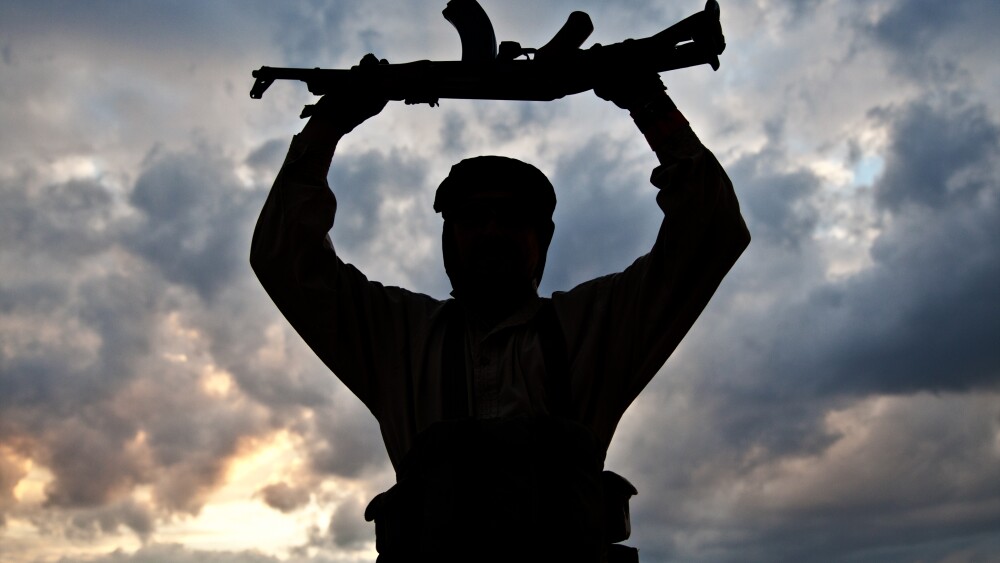Imagine talking about regime change for decades, hosting posh conferences that cost millions of dollars, paying five- and perhaps even six-figure honoraria to retired politicians, cabinet secretaries, and ministers from across the United States and Western world, all the while claiming that a veiled septuagenarian leader who never won an election and consistently polled with less than 1 percent support was Iran’s future popular leader. Then Israel strikes at Iran to end the Islamic Republic, inflicting the regime’s greatest crisis in forty-six years and… crickets. Pro-forma statements that do little and certainly do not call for meaningful regime change. That describes Iran’s Mujahedin al-Khalq (MEK, MKO).
Perhaps the MEK or its political umbrella, the National Council of Resistance of Iran, is upset. After all, despite their rhetoric of opposition, the MEK cannot erase their history. Their leadership embraced Ayatollah Ruhollah Khomeini prior to the Islamic Revolution and worked fist-in-glove with him until Khomeini sought to discard them alongside other allies as he consolidated control. The MEK then fled into exile and offered their services to Iraq’s Saddam Hussein, both to strike into Iran and to help Saddam’s Republican Guards suppress Iraqi Kurds. This is why ordinary Iranians despise the group.
The MEK has always been problematic. It operates like a cult.
The MEK has always been problematic. It operates like a cult, its children notoriously isolated and absent from schools where they might mix with other students from outside communities. Its American proxy groups’ tax forms make little sense. This is problematic given how the MEK channels honoraria for American politicians. When not enticing American officials to endorse them, the group indoctrinates its members in anti-Americanism.
Still, it has long insisted that it was Iran’s most popular movement. It used that repeated claim as a means to block or besmirch other opposition groups or co-opt initiatives such as the referendum movement that called for a new referendum to allow Iranians to endorse or denounce Islamic Republic as form of government more than 15 years ago. The group’s leaders and officials seem more obsessed with the son of the late shah than they do with brining down the Islamic Republic.
Traditionally, the MEK has claimed they so deeply penetrated the regime that they could expose intelligence no other groups could. Essentially, the MEK said they were the real deal, and other Islamic Republic dissidents and oppositionists were more talk than substance. In reality, there were red flags. A quarter-century ago, for example, the MEK put a supposed defector it identified as Ahmad Behbahani in touch with CBS’ 60 Minutes for an interview, in which Behbahani claimed he oversaw Iranian terrorism and said that Iran, not Muammar Qadhafi’s Libya, was responsible for the downing of Pan Am Flight 103 over Lockerbie, Scotland. The alleged Behbahani made several other spectacular charges. The problem was that Behbahani was a fraud; physically, he could not have been the real suspect because the man the MEK put forward was several inches too short.
Nor was this the only MEK fraud. MEK representatives often would shop fraudulent documents around Washington; as a Pentagon desk officer, I and my colleagues intercepted several. The MEK goal seemed clear: While they claimed opposition, they hoped Bush administration hardliners who sought regime change in Iran would bite only to be subsequently discredited when the fraud was exposed.
That is not to say that the MEK does not break news. They were the first group to expose publicly the then-covert Natanz enrichment facility in 2002, and have since announced various other sites. Especially now, such announcements appear much more likely a mechanism for foreign intelligence services—most likely Israel’s and/or Saudi Arabia’s—to publicize findings without their own fingerprints.
As Iranians make their voice heard, the MEK knows they are toast. They will be exposed as frauds.
With the regime teetering, the MEK is as well. The group opposed Ayatollahs Khomeini and Khamenei not because they opposed the Islamic Republic, but because the MEK wanted to be in charge of the Islamic Republic. As Iranians make their voice heard, the MEK knows they are toast. They will be exposed as frauds, and those supporting them will rightly have their judgment questioned, much like the many American academics who once embraced the Khmer Rouge in Cambodia as progressives, a phenomenon that scholar Guenter Lewy documented.
Perhaps it is time for those who took MEK money in the name of helping to advance regime change actually do so by redirecting those honoraria to the strike funds that Iranians desperately need today.
As the Islamic Republic collapses, the MEK will fade away as well—for three reasons. First, the regime that long has used the group to attack legitimate opposition no longer will need then group as its tool. Second, foreign intelligence agencies have dispensed with shadow boxing and are now at blows.
Once again, the MEK has lost its role. Finally, the Iranian people will speak and put the mutated mixture of Islamism and Marxism to bed, for as Iranians move forward, they will seek democracy rather than cast their lot with two ideologies representing the failures of the past.







